
Introduction:
Did Jesus understand Himself to be the Messiah and revelation of God in human flesh? This two-fold question is important to answer, since many today claim that Jesus never understood Himself to be neither. In yesterday's post we considered how Jesus understood Himself to be on equal par- with God by his phrase: "but I say". This phrase was His way of saying He was equal in authority to the Old Testament and above and superior to the Jewish traditions of His time. Such a statement undoubtedly sparked controversy and marvel from both Jesus' opponents and followers.
In today's post we raise the question again: how well did Jesus understand Himself to be with respect to being the Messiah and decisive revelation of God in human flesh? In conversations that I've had over the years with people of differing worldviews, religions and even-skeptics - the charge has been that Jesus never claimed to be the Messiah nor God's decisive revelation of Himself in true humanity. Demonstrating this to be the case is important, since the Jesus I worship and preach and that Bible believing Christians have staked their trust in must surely be more than another "prophet" or mere "holy-man".
As I noted yesterday, this series of posts aims to explore whether or not Jesus understood Himself (by way of his words and actions) to not only be the Messiah or deliverer of His people, but also God in human flesh, the Savior of the world and other truths that are unfolded in the New Testament. We witnessed yesterday Jesus' implicit claim to be Divinely authoritative by way of His phrase: "but I say to you". Today, we will consider another action and teaching of Jesus, whereby He uses the phrase: "truly, truly I say to you" or "verily, verily I say to you".
How Jesus' use of "truly, truly" or "verily, verily" or "amen, amen" was His way of claiming to be the sole gateway to God
Whenever one reads any of the writings of the Jewish teachers of Jesus day, the teacher (or Rabbi) would give his exposition of a particular text, and then end the teaching by way of the phrase "truly" (or "amen" or for those who use the KJV, "verily"). Such a method was the Rabbi's way of saying "what I just said is based upon the Bible and other authoritative tradition" or "what I just taught can be confirmed by others". No Rabbi would had ever dreamed of placing this phrase in front of their teaching, lest they be presuming themselves to need no other validating authority. As a matter of fact, if any Rabbi would had done such a practice, it would be assumed He was setting himself up to be His own authority - which only God can do.
When we compare Jesus' teaching and actions, we discover that unlike the Rabbi's of his day, Jesus did what would had been unthinkable - he started out His teachings oftentimes by the phrase: "truly, truly" (or "verily, verily" or "amen, amen"). In John 1:51, we read Jesus saying: "And He said to him, “Truly, truly, I say to you, you will see the heavens opened and the angels of God ascending and descending on the Son of Man.”
Jesus' words to Nathanael - whom he was calling to be a disciple - was that the vision that Old Testament Jacob had of his encounter with God at Peniel in Genesis 28 concerning the ladder descending from heaven to earth was nothing short of Jesus Himself! The mysterious ladder with angels ascending and descending certainly perplexed Jacob, prompting him to exclaim in Genesis 28:16-17 Then Jacob awoke from his sleep and said, “Surely the Lord is in this place, and I did not know it.” 17 He was afraid and said, “How awesome is this place! This is none other than the house of God, and this is the gate of heaven.”
Though Jacob (the patriarch whose sons were the originators of Israel's twelve tribes) may not had comprehended the identity of the ladder, he knew enough by grace to conclude that He had been encountered by God Himself. As Jesus expresses commentary on this very text to Nathanael, (whom by the way he designates as an Israelite in whom there is no guile, a wordplay on Jacob's original name meaning "one who has guile, a deceiver), Jesus unveils the fact that He himself is the gateway to God.
Now herein is the kicker, prior to this entire exposition, Jesus frontloads his teaching with the phrase: "truly, truly". In other words, Jesus is in effect saying that He has authority to express the truth of Genesis 28, and thus requires no other authority to verify His self-interpretation to Nathanael.
This strategy of Jesus in placing "truly, truly" (or "amen, amen") in front of His teachins is found throughout John's Gospel (John 1:51; 3:3,5,11; 5:24,25; 6:26,32,47,53; 8:34,51,58; 10:1,7; 12:24; 13:16,20,21,38; 14:12; 16:20,23; 21:18) Is it any wonder we find Jesus not just implicitly demonstrating this fact by his saying "truly, truly", but also explicitly saying Himself to be "The way, the truth and the life" in John 14:6? It is clear both by the implicit words and actions of Jesus, as well as explicit utterances such as John 14:6, that Jesus understood Himself to be the Messiah and God in human flesh. Therefore we have yet another line of proof from Jesus' own lips and actions regarding His self-understanding as Messiah and God Incarnate.

No comments:
Post a Comment